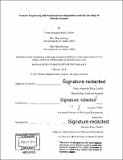Genome engineering and functional gene regulation tools for the study of malaria parasites
Author(s)
Falla Castillo, Diana Alejandra
DownloadFull printable version (17.10Mb)
Other Contributors
Massachusetts Institute of Technology. Department of Biology.
Advisor
Jacquin C.Niles.
Terms of use
Metadata
Show full item recordAbstract
Plasmodium falciparum is the causative agent of the most severe form of human malaria, a mosquito-borne disease that remains a major global health problem. The efforts to create new antimalarial drugs and effective vaccines have been significantly hindered by the lack of robust tools for performing functional genetics in P. falciparum. The identification and characterization of essential functions for parasite survival are fundamental steps towards the creation of effective antimalarial therapies. In this work, we developed an integrated set of gene editing and functional gene regulation tools that enable the study of essential and non-essential genes in blood stage parasites. We first created a robust and versatile conditional expression system that uses a fusion of endogenous translational regulatory elements and synthetic RNA-protein modules to regulate gene expression in the parasite. Using this system, we achieved tight regulation of expression of reporter and essential antimalarial genes. Next, we created an integrated strategy that utilizes our conditional system together with a CRISPR-Cas9 gene editing system to identify and characterize the function of an essential RNA-Binding protein (RBP). We first determined the essentiality of our target protein using a two-step approach, in which a merodiploid line conditionally expresses an ectopic copy of the RBP and the native gene is disrupted using CRISPR technologies. This approach was next streamlined into a single-step methodology to genetically modify native loci to regulate expression from their promoters. We performed biochemical and biological characterization of this essential protein, and established the role of this RBP in cell cycle progression and parasite schizogony. Finally, to expand the repertoire of P.falciparum target loci, we implemented the editing activity of CRISPR-Cpfl, and showed high efficiency in the disruption of non-essential genes and genes located in AT-rich regions. We also integrated the Cpfl editing activity with our conditional system to achieve conditional regulation of native loci. This work combines genome-engineering technologies and regulatory systems designed to provide a robust platform for the identification and characterization of essential functions in human malarial parasites.
Description
Thesis: Ph. D. in Microbiology, Massachusetts Institute of Technology, Department of Biology, February 2018. Cataloged from PDF version of thesis. "February 2018." Includes bibliographical references.
Date issued
2018Department
Massachusetts Institute of Technology. Department of BiologyPublisher
Massachusetts Institute of Technology
Keywords
Biology.